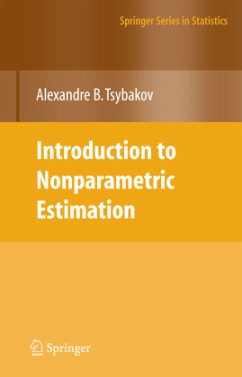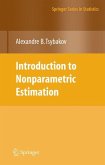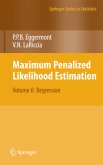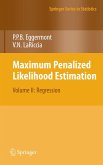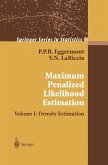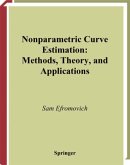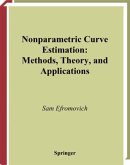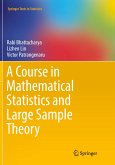This is a concise text developed from lecture notes and ready to be used for a course on the graduate level. The main idea is to introduce the fundamental concepts of the theory while maintaining the exposition suitable for a first approach in the field. Therefore, the results are not always given in the most general form but rather under assumptions that lead to shorter or more elegant proofs.
The book has three chapters. Chapter 1 presents basic nonparametric regression and density estimators and analyzes their properties. Chapter 2 is devoted to a detailed treatment of minimax lower bounds. Chapter 3 develops more advanced topics: Pinsker's theorem, oracle inequalities, Stein shrinkage, and sharp minimax adaptivity.
This book will be useful for researchers and grad students interested in theoretical aspects of smoothing techniques. Many important and useful results on optimal and adaptive estimation are provided. As one of the leading mathematical statisticians working in nonparametrics, the author is an authority on the subject.
Methods of nonparametric estimation are located at the core of modern statistical science. The aim of this book is to give a short but mathematically self-contained introduction to the theory of nonparametric estimation. The emphasis is on the construction of optimal estimators; therefore the concepts of minimax optimality and adaptivity, as well as the oracle approach, occupy the central place in the book.
This is a concise text developed from lecture notes and ready to be used for a course on the graduate level. The main idea is to introduce the fundamental concepts of the theory while maintaining the exposition suitable for a first approach in the field. Therefore, the results are not always given in the most general form but rather under assumptions that lead to shorter or more elegant proofs.
The book has three chapters. Chapter 1 presents basic nonparametric regression and density estimators and analyzes their properties. Chapter 2 is devoted to a detailedtreatment of minimax lower bounds. Chapter 3 develops more advanced topics: Pinsker's theorem, oracle inequalities, Stein shrinkage, and sharp minimax adaptivity.
The book has three chapters. Chapter 1 presents basic nonparametric regression and density estimators and analyzes their properties. Chapter 2 is devoted to a detailed treatment of minimax lower bounds. Chapter 3 develops more advanced topics: Pinsker's theorem, oracle inequalities, Stein shrinkage, and sharp minimax adaptivity.
This book will be useful for researchers and grad students interested in theoretical aspects of smoothing techniques. Many important and useful results on optimal and adaptive estimation are provided. As one of the leading mathematical statisticians working in nonparametrics, the author is an authority on the subject.
Methods of nonparametric estimation are located at the core of modern statistical science. The aim of this book is to give a short but mathematically self-contained introduction to the theory of nonparametric estimation. The emphasis is on the construction of optimal estimators; therefore the concepts of minimax optimality and adaptivity, as well as the oracle approach, occupy the central place in the book.
This is a concise text developed from lecture notes and ready to be used for a course on the graduate level. The main idea is to introduce the fundamental concepts of the theory while maintaining the exposition suitable for a first approach in the field. Therefore, the results are not always given in the most general form but rather under assumptions that lead to shorter or more elegant proofs.
The book has three chapters. Chapter 1 presents basic nonparametric regression and density estimators and analyzes their properties. Chapter 2 is devoted to a detailedtreatment of minimax lower bounds. Chapter 3 develops more advanced topics: Pinsker's theorem, oracle inequalities, Stein shrinkage, and sharp minimax adaptivity.
From the reviews:
"The book is meant to be an introduction to the rich theory of nonparametric estimation through some simple models and examples. The detailed proofs given in the book will help the interested reader to understand the subject better. This well written book will be welcomed by all those interested in learning the presented concepts. The author should be complimented for a good treatise with detailed proofs of several important results in nonparametric estimation theory." (Ravi Sreenivasan, Zentralblatt MATH, Vol. 1176, 2010)
"...A short and rigorous introduction to minimax results for estimators of densities and regression functions from independent observations. Each of the three chapters ends with a section containing detailed biographical notes and a section with exercises complementing and illustrating the main results. This book is an excellent introduction to the results and techniques of minimax estimation." (Journal of the American Statistical Association, Vol. 105, No. 489)
"The potential reader of this book should be conversant with functional analysis and topology ... . for a broad spectrum of mathematical statisticians, especially in the Continental Europe, this will be welcome as a good reading material. ... attempts to formulate the basic theory of nonparametric functional estimation, including (i) construction of such estimators, (ii) their (asymptotic) statistical properties, (iii) optimality, in some sense, and (iv) adaptive estimation. The author contends to present the material ... in a broad sense more acceptable to statisticians." (Pranab K. Sen, International Statistical Review, Vol. 79 (2), 2011)
"The book is meant to be an introduction to the rich theory of nonparametric estimation through some simple models and examples. The detailed proofs given in the book will help the interested reader to understand the subject better. This well written book will be welcomed by all those interested in learning the presented concepts. The author should be complimented for a good treatise with detailed proofs of several important results in nonparametric estimation theory." (Ravi Sreenivasan, Zentralblatt MATH, Vol. 1176, 2010)
"...A short and rigorous introduction to minimax results for estimators of densities and regression functions from independent observations. Each of the three chapters ends with a section containing detailed biographical notes and a section with exercises complementing and illustrating the main results. This book is an excellent introduction to the results and techniques of minimax estimation." (Journal of the American Statistical Association, Vol. 105, No. 489)
"The potential reader of this book should be conversant with functional analysis and topology ... . for a broad spectrum of mathematical statisticians, especially in the Continental Europe, this will be welcome as a good reading material. ... attempts to formulate the basic theory of nonparametric functional estimation, including (i) construction of such estimators, (ii) their (asymptotic) statistical properties, (iii) optimality, in some sense, and (iv) adaptive estimation. The author contends to present the material ... in a broad sense more acceptable to statisticians." (Pranab K. Sen, International Statistical Review, Vol. 79 (2), 2011)

